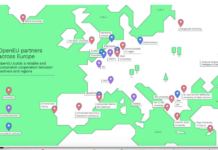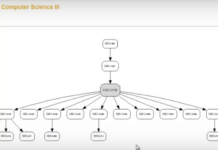
The players
Since April I have been leading a small team that has been trying to build from scratch a national survey of online learning in Canadian post-secondary institutions.
For many years the Babson Survey Research Group has been tracking the growth of online learning in higher education in the USA. With the U.S. Federal Department of Education now collecting this data through its annual IPEDS survey, Jeff Seaman of Babson has been working with Russ Poulin of WCET to help interpret the IPEDS data.
Through the intervention of Tricia Donovan, the director of eCampus Alberta, Jeff and Russ approached me to see if I would be willing to get a Canadian national survey off the ground. I guess I was chosen because through my blog I had been strongly critical of the lack of such data in Canada. (Warning to bloggers: be careful what you ask for as you may end up doing it yourself.)
As a Research Associate with Contact North, I approached its President, Maxim Jean-Louis, for his support. He immediately offered $10,000 towards the cost of the survey. This was a crucial contribution as it enabled me to sound out possible consultants for the project, because Babson had found that the most important contributor to success was ensuring close communication and co-operation with the institutions themselves before the survey was even designed.
The Contact North funding enabled me to approach Dr. Ross Paul, formerly President of two Canadian universities and more importantly, as the author of “Leadership Under Fire”, a book about the role of university presidents in Canada, he was extremely well connected with and knowledgeable about the whole Canadian university sector.
Maxim Jean-Louis also put me in touch with Brian Desbiens, a former college president and also a former chair of the Canadian College Presidents Network, another consultant with an immensely impressive network in the Canadian college sector.
Finally it was immediately clear to us that we needed someone with knowledge and expertise in the francophone sector, and through the assistance of REFAD, the francophone distance education network, Denis Mayer, a former Associate Vice President of Student Services at Laurentian University, also joined the team.
So we now had a steering group for the survey:
- Tony Bates (lead researcher)
- Ross Paul (universities)
- Brian Desbiens (colleges)
- Denis Mayer (francophone)
- Tricia Donovan (provincial government agencies)
- Jeff Seaman (survey design and implementation)
- Russ Poulin (US liaison)
The process
Our first task was to ensure that we had support, or at least not opposition, from the institutions, about 80 universities and over 200 publicly funded colleges. Fortunately in Canada there are almost no private universities and there is a clear distinction between provincially funded and supported colleges and private career and language schools. Our survey is focused then solely on the public system of post-secondary education, consisting of just over 2 million students.
One challenge is that there is no overall federal responsibility for the delivery of post-secondary education in Canada. This means that there are 10 provinces with 10 slightly different systems of post-secondary education. In addition there are anglophone, francophone and bilingual institutions.
Nevertheless there are two key national organisations, Universities Canada (UC), and Colleges and Institutes Canada (CICAN), that between them cover most of the institutions, so one of our first tasks was to brief them and gain their support in communicating with the institutions. Also there are several francophone organisations that represent the interests of francophone universities and colleges, and the unique system in Québec of CEGEPs, publicly funded pre-university colleges that offer a pre-university qualification that is necessary for admission to Québec’s universities (except for mature students). Secondary school and undergraduate degrees are both one year shorter in Quebec as a result.
These initial contacts with the national or regional organisations enabled us to identify the population base for the survey: the list of institutions to be covered. This enabled the consultants to e-mail directly the provosts and VPs Academic of every institution for their support and participation in the study.
At the same time, the Steering Committee was engaged in a series of discussions around the design of the questionnaires. We had the advantage of the prior work of the Babson Survey Research Group in the USA, but the questionnaires had to be adapted to the unique Canadian post-secondary education system. At the same time we are anxious to ensure that we can make international comparisons. It became quickly clear that we will need several different versions of the questionnaire, as follows:
- anglophone universities
- anglophone colleges
- francophone universities
- CEGEPS
- francophone colleges (outside Québec).
Core questions would be the same across all versions, but others would reflect the unique nature of each institution (e.g. what qualifications were offered partly or wholly online).
To get early feedback on the questionnaire design, two consultants attended the CIRPA conference of Canadian institutional researchers and held a special session devoted to feedback on the initial questionnaire design and especially in the definitions of fully online and blended/hybrid learning.
The first full versions of the questionnaires have now been designed. We have identified 10 universities and eight colleges across all 10 provinces who have volunteered to give feedback on the pilot questionnaire, and they have been asked to reply by the end of December. We are planning one more round of piloting after that, and hope to have the final version of the questionnaire distributed to all the universities and colleges in March.
In order to keep the questionnaire as short as possible, we are collecting as much key data about the institutions, such as their size, from other sources. For instance, the Canadian Virtual University has provided data on distance education enrolments for its dozen or so member institutions that go back to 2001. In the end, we will have an extensive and comprehensive database of Canadian post-secondary educational institutions, and of their activities in online learning.
I am working with Jeff Seaman on the design of the questionnaire analysis, and we will use the Babson Survey Research Group’s data entry and analysis facilities to process the questionnaire data. We envisage one overall, national report in English and French and a number of smaller reports focused on specific sectors, including a specially written report on the francophone sector. These will be published in the summer of 2017, and the results will be presented at the ICDE’s World Congress on Online Learning in Toronto in October.
Lastly, we will not be identifying any individual institution, unless they expressly request to be identified, but we do aim to make the data open and accessible to other researchers. We hope to locate the data with one or more of the organizations representing the institutions.
Funding
The Babson surveys in the USA benefited from financial support from the Sloan Foundation and also from a number of private sponsors, such as publishers. Funding frankly has been the biggest challenge so far for the Canadian survey.
We decided to divide the funding requirements into three stages. The first stage would be to acquire funds to develop the institutional support needed, build the database, and design and pilot the questionnaire. The second stage of funding would be to cover the costs of the data collection, data entry, data analysis, report writing and dissemination, as well as having sufficient funds to start the development of the following year’s survey. The third phase would be to cover long-term and regular funding for future annual surveys.
We have successfully completed the first phase of fund raising, thanks to the help of Contact North and the provincial eCampuses (BCcampus, eCampus Alberta, Campus Manitoba and eCampus Ontario). This has raised $45,000.
We are still seeking funding for the second phase. We estimate that we will need somewhere around $100,000 to complete the second phase, and for the third phase we will need to raise about $125,000 a year.
We have submitted requests for second stage funding to eCampus Ontario’s Research and Innovation Fund and to a Canadian foundation, and we are waiting to hear from them. The Canadian arm of a major publisher has also expressed an interest in supporting the survey. However, we are now at the point where we urgently need to secure firm funding for the second stage.
What we need
The project is now at a critical point in its development. We have secured the support of the institutions, we are ready to pilot the questionnaire, and we are building the institutional database. However, we still need the following:
- money to cover the costs of the actual survey and report writing (in both English and French)
- feedback on the definitions of online learning, whether we have the right questions, and whether institutions can actually provide the data requested; the piloting will provide this feedback
- all institutions, large and small, whether they have strong or no online programs at all, to complete the questionnaire.
The benefits
If we are successful in completing the study, we hope that we will have achieved the following:
- established a reliable snapshot of the state of online learning across Canada in post-secondary education
- created a comprehensive, national database of Canadian post-secondary educational institutions that could be used for further research purposes
- provided a baseline for future studies of online learning, so trends can be tracked
- identified the areas where online learning is growing or declining
- identified some of the key issues that institutions are facing regarding online learning
- enabled institutions to see how they compare with other institutions in Canada in terms of their online learning development
- enabled Canada to compare itself with developments in online learning in other countries.
Your help
Although we are still pursuing a number of possible sources of funding, if you have ideas of where or how to secure the the second and third stages of funding, please contact me at tony.bates@ubc.ca.
In particular, I urge Canadian readers of this blog to give their support within their institution to ensure that we get as good a response as possible to completing the questionnaire so that we have a reliable and comprehensive survey.
Any other comments about the value of the survey or the strategy we are following will also of course be welcome.
In the meantime, watch this space for further developments.
References
Paul, R. (2011) Leadership Under Fire: The Challenging Role of the Canadian University President Montreal & Kingston: McGill-Queen’s University Press, pp. 333









 Dr. Tony Bates is the author of eleven books in the field of online learning and distance education. He has provided consulting services specializing in training in the planning and management of online learning and distance education, working with over 40 organizations in 25 countries. Tony is a Research Associate with Contact North | Contact Nord, Ontario’s Distance Education & Training Network.
Dr. Tony Bates is the author of eleven books in the field of online learning and distance education. He has provided consulting services specializing in training in the planning and management of online learning and distance education, working with over 40 organizations in 25 countries. Tony is a Research Associate with Contact North | Contact Nord, Ontario’s Distance Education & Training Network.

